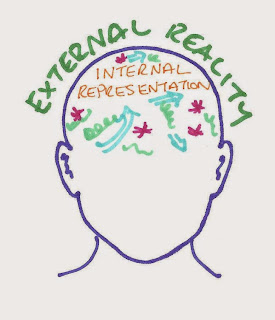I thought it would be useful to give
you some insight into how our brains take in information and how it learns so
that you can start to understand why you see the world differently to someone
else and be able to develop your own strategies in your sport
Over the coming weeks I'm going to be
writing various articles to help you build your understanding of how you work
and what you need to do in order to be able to achieve your goals.
But first what is actually going on in
our heads...
It is estimated that
our brain receives more than 2 million bits of information through our senses
every second. If we were to take in all
this information consciously it would drive us absolutely crazy. So what happens to all this information? Well, according to memory theorist George
Miller, we can only consciously process 7 +/- 2 bits of information at any
given moment. So in the speed of a
second, the mind has to compress about 2 million bits of information down to 7
+/- bits of information.
In order to make
sense of this vast difference (two million down to seven) the mind filters the
events our senses take in by deleting, distorting and generalising the
information through our language, memories, attitudes, values, beliefs, decisions,
etc. We then make an internal representation of the world we are taking in,
with pictures, sounds and feeling. That
puts us in a state of mind, which can change our physiology that affects our
behaviour. All this happens in a
fraction of a second and none of it has to happen in any particular order. We are in a constant state of flux, where our
physiology can affect our attitudes just as easily as our behaviour can affect
our language.
What this tells us is that the world that we
experience is not the world that is outside of us, it is a world that we are
creating inside. We do not experience
reality as it is, we only experience our own perception of reality. As we all have different sets of filters
(that being different sets of values, beliefs, memories etc.), we will all have
our own unique perception of the world.
This explains how one person can perceive an event completely
differently to another person who has experienced the same event.
If we did not delete, distort and generalize
the events we take in, consciously we would be in sensory overload. It's the
sensation of more things happening than you can handle, which can be quite
overwhelming!
Delete – This is when we omit
data or selectively pay attention to certain parts of our experience and not
others. Think of a time when you were so
engage in a conversion with someone that you were unaware of other events going
on around you.
Distort – This is when we can change the information
around us to fit what we expect or believe.
Do you remember a time when you where looking for your keys and not seen
them because they weren’t where we expected them to be. Someone else helps you look for them and
finds them instantly, ‘but I looked there’ we say, not realising that we have
experienced a distortion in our sensory information!
Generalise – This is when we put ideas, people or things into a
convenient group or category. We may
generalise that all swans are white, until we come across Australian swans –
which are black.
By making small changes
to our thoughts (internal representation), our emotions (our state) and/or our
body (physiology), we can make a big difference in our behaviour and therefore our
outcome.
You can change one or
all three and start in any order. They
are all linked neurologically together in templates.
What are Templates?
Whenever we have a memory, be it a
smell, a happy memory, painful memory, a movement, it is there because our
brain has fired off a template.
Templates are created when we learn (which
we are constantly doing!) and are nerve cells that have wired together in a way
to hold the different parts of that memory as one and the wiring together of
nerve cells is mainly under the control of our emotional system. Everything we remember is stored in a
template (or a number of templates) and the nerve cells look to make
connections with each other when they are firing at the same time and then the
chemicals in the brain start to get involved to help those connections build!
What this means for us is that our
brains are always learning and we can also unlearn and learn again, if we've
taken in information and created an internal representation that is not useful
to us we can change it by understanding the science of the brain as well as the
thinking of the mind. It also means we
can create very strong templates of strategies that will take us forward in our
sport.
'The Little Book of Big Stuff About
the Brain' by Dr Andrew Curran is an excellent read that goes into the details
of how our brain works in a really accessible way
Next time we will be looking at
Preparing to Succeed...


















































